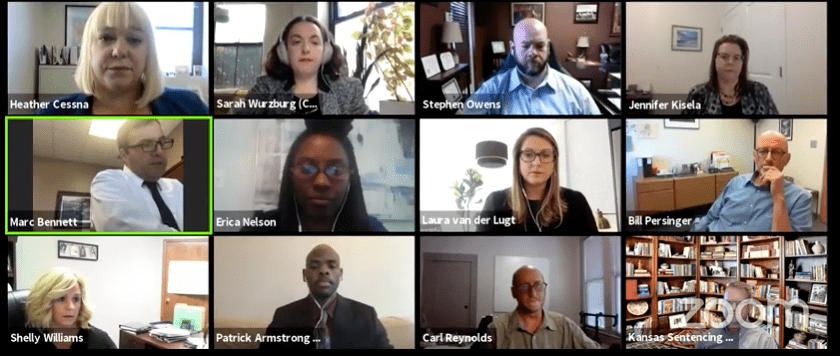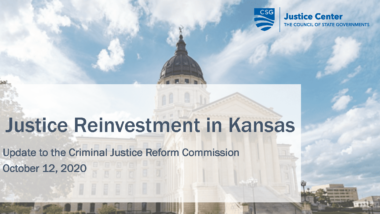
Kansas Criminal Justice Reform Commission Discusses Policy Recommendations
Staff from The Council of State Governments (CSG) Justice Center met with the Kansas Criminal Justice Reform Commission last week to present findings and policy recommendations based on recent assessment activities as part of the state’s Justice Reinvestment effort, which launched in September.
Key takeaways from the CSG Justice Center’s presentation included the following:
- From fiscal years 2015 to 2019, an increase of 1,396 felony sentences was primarily due to sentences for drug possession.
- The use of prison as a sentencing option and as a tool for revocation varies widely by county, but 25 percent of all sentences statewide are sentences to prison.
- Of the top 10 counties that send the most people to prison, Douglas and Crawford Counties used prison in 41 percent and 16 percent of their sentences, respectively. Also, Ford County revoked people to prison in 43 percent of its revocation hearings, and Shawnee revoked people in 19 percent of its hearings.
Kansas is facing an unprecedented budget deficit and must prioritize corrections investments that work to reduce recidivism and maintain public safety. In fiscal year 2019, the state spent an estimated $41 million to incarcerate people for drug offenses and an estimated $43 million to incarcerate people who violated supervision conditions. Through the Justice Reinvestment process, Kansas is aiming to improve the overall outcomes of its criminal justice system and permanently interrupt cycles of recidivism.
The Commission’s subcommittees are now considering policy recommendations related to victims’ issues, violent crime, sentencing, supervision, behavioral health, and reentry. The subcommittees will meet again in the coming weeks to vote on recommendations, and the full Commission will reconvene on November 9 to decide which recommendations to move forward for legislative or administrative action.
Photo caption: Members of the Kansas Criminal Justice Reform Commission met with CSG Justice Center staff on October 12.
This project was supported by Grant No. 2019- ZB-BX-K002 awarded by the Bureau of Justice Assistance. The Bureau of Justice Assistance is a component of the Department of Justice’s Office of Justice Programs, which also includes the Bureau of Justice Statistics, the National Institute of Justice, the Office of Juvenile Justice and Delinquency Prevention, the Office for Victims of Crime, and the SMART Office. Points of view or opinions in this document are those of the author and do not necessarily represent the official position or policies of the U.S. Department of Justice.
About the Author

Arkansas policymakers have long expressed concerns about the state’s high recidivism rate. Over the past 10 years, an…
Read MoreIn April 2025, Arkansas Governor Sarah Huckabee Sanders signed a package of bipartisan criminal justice legislation into law,…
Read More Explainer: Key Findings and Options from Arkansas’s Justice Reinvestment Initiative
Explainer: Key Findings and Options from Arkansas’s Justice Reinvestment Initiative
Arkansas policymakers have long expressed concerns about the state’s high recidivism rate.…
Read More Explainer: How a New Law in Arkansas Tackles Crime, Recidivism, and Community Supervision Challenges
Explainer: How a New Law in Arkansas Tackles Crime, Recidivism, and Community Supervision Challenges
In April 2025, Arkansas Governor Sarah Huckabee Sanders signed a package of…
Read More










